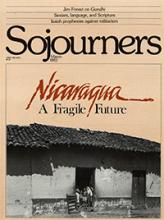The following is part of a dialogue that took place in Managua between the North American delegation and a group of indigenous evangelical pastors from the Nicaraguan countryside. The conversation focused on the impact of the revolution on evangelical faith in Nicaragua.
--The Editors
Alvino Melendez (Baptist Church): We have been challenged by the revolution to go deeper in our concept of salvation. From a theological viewpoint, there is no salvation of the soul, but of the person. We don't speak now only of the spirit.
Rodolfo Fonseca (Church of God): Before the revolution, our preaching was directed more toward the spiritual. That is still the principal aspect, but we weren't preaching an integral gospel according to Scripture. Luke 4:16 teaches us that salvation is not only spiritual, but liberates the person from the many things that society makes him captive to.
Gustavo Parajon (CEPAD): In the perspective of Ephesians, chapter four, Paul speaks of the growth of the Christian. After we initiate our travel with the Lord, our journey, we are perfected by Jesus Christ to the fullness of the stature of Jesus Christ. Sometimes as evangelicals all we preach is the new birth, and then we leave dwarfs; there is no growth, building up of the body of Christ. And then these dwarf Christians cannot do the ministry that Ephesians four teaches.
Thelma Pereira (Waves of Light radio station): I understand that the Christian is saved from the moment of belief in Jesus Christ as Lord. The process of spiritual growth comes later, but salvation is only by grace.
You have asked how we feel about the revolution as evangelicals. I would say God permits different situations for growth. This is what has happened in Nicaragua.
Read the Full Article

